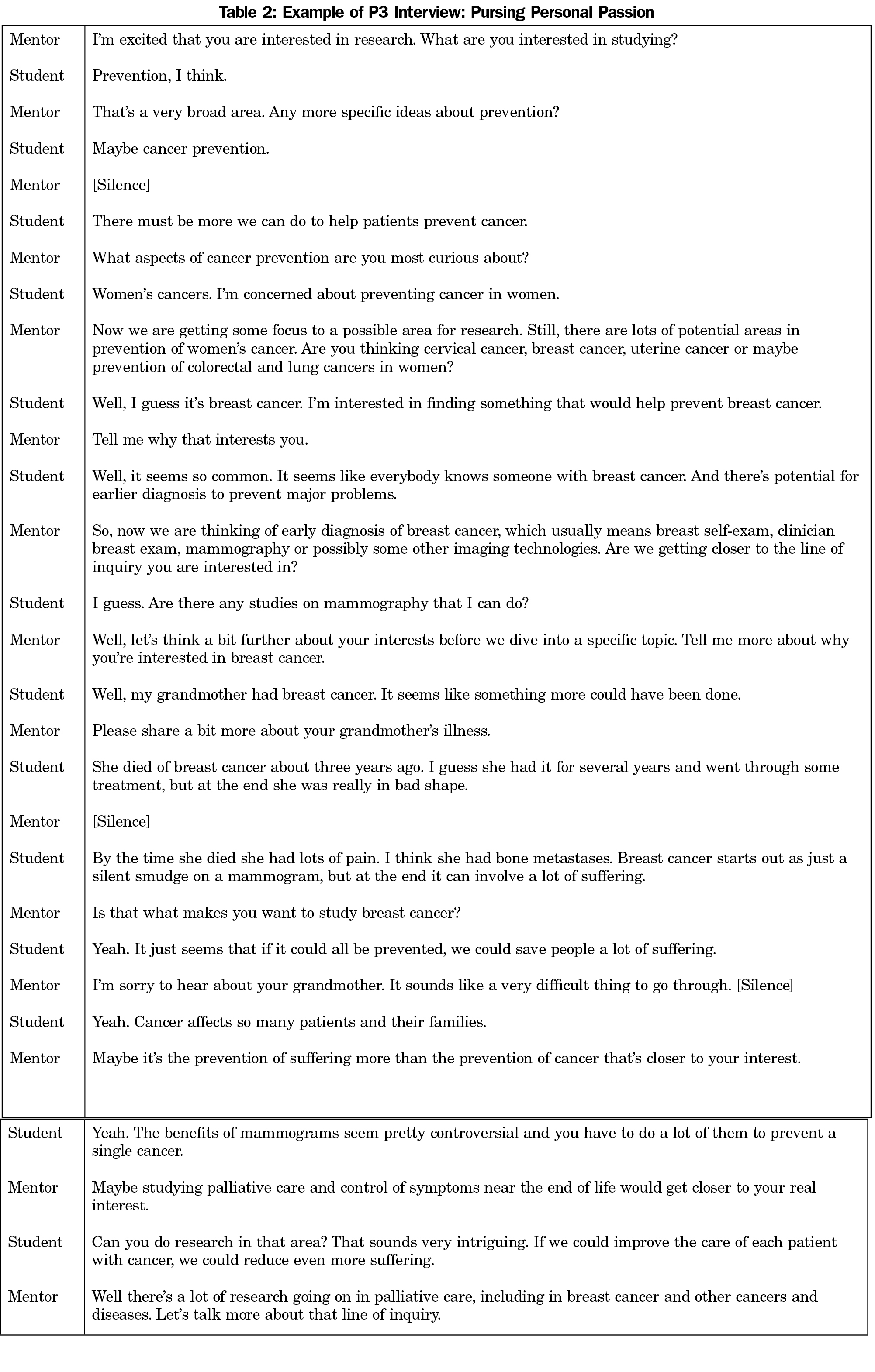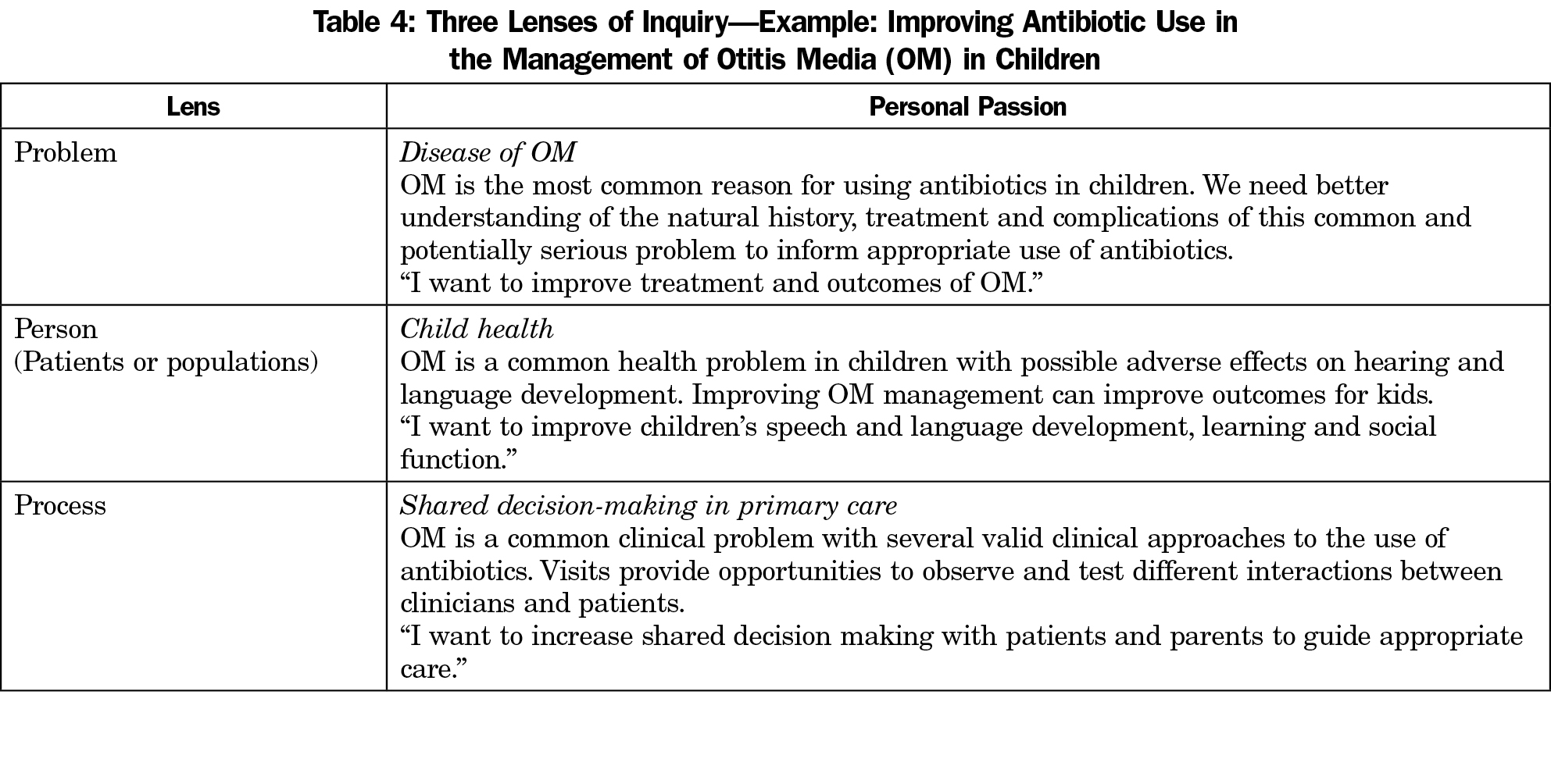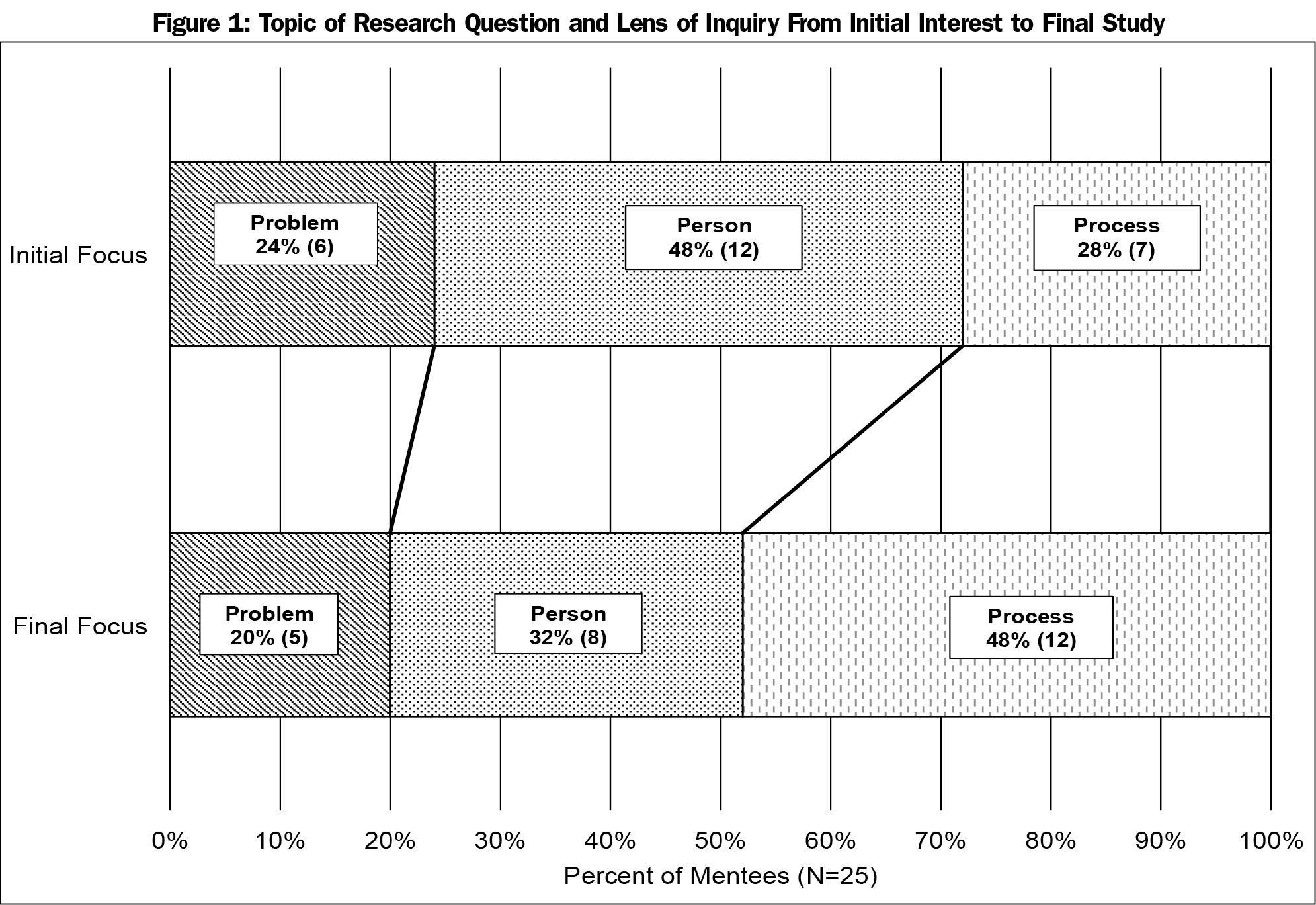abstract: New researchers often face difficulty finding and focusing research questions. I describe a new tool for research mentoring, the Pursuing Personal Passion (P3) interview, and a systematic approach to help learners organize their curiosity and develop researchable questions aligned with their personal and professional priorities. The learner-centered P3 research interview parallels the patient-centered clinical interview. This paper reviews experience with 27 research mentees over the years 2009 to 2016, using the P3 approach to identify their initial research topics, classify their underlying passions and track the evolution into their final research questions. These researchers usually identified one of three personal passions that provided lenses to focus their research: problem, person, or process. Initial research topics focused on: problem (24%, 6), person (48%, 12) and process (28%, 7). Final research questions evolved into: problem (20%, 5), person (32%, 8) and process (48%, 12). Identification of the underlying passion can lead researchers who start with one general topic to develop it into very different research questions. Using this P3 approach, mentors can help new researchers focus their interests into researchable questions, successful studies, and organized programs of scholarship.
New researchers often face difficulty finding and focusing a specific research question. Family physicians have broad interests and encounter a wide array of health problems that lead to myriad potential questions.1,2 The path from a clinical problem or a personal interest to a specific researchable question is often a long journey. The mentor can help as a guide along the way.
Many new to research seek the guidance of one or more mentors, yet there is little advice and less evidence on the methods of research mentorship, particularly for this early but key step of selecting topics and developing questions.3,4 Often, new researchers are simply assigned topics based on available data, priorities of other researchers, or convenience of the mentor.
This paper describes a systematic approach that research mentors can use to facilitate this process, using a new method called the Pursuing Personal Passion (P3) interview. This values clarification process can help learners organize their curiosity and develop researchable questions aligned with their personal and professional priorities.
The P3 Pursuing Personal Passion interview technique evolved over 35 years of experience working with new researchers at all levels: undergraduates, medical students, residents, research fellows, graduate students, early career faculty, and community-based clinicians. My long-term mentoring relationships allowed longitudinal observation of scholarly work from initial interests to research careers.
The P3 interview closely parallels the strategies used in the patient-centered clinical interview,5 using open-ended questions, empathy, silence, reflection, restatement, and partnership to develop a shared plan. As with clinical interviewing, the P3 interview requires both strategic questioning and mindful listening.
In patient interviews, novice clinicians often dive prematurely6 into symptoms and possible diagnoses. A patient-centered approach is more effective and ultimately more efficient, starting with open-ended questions to explore the patient’s agenda and view of the illness experience.7 Similarly, in research, premature focus on mentor interests, fundable topics, and scientific methods may sidetrack curiosity and stifle creativity. The P3 interview is learner-centered, to help new researchers explore the roots of their own interests.
Skillful mentoring requires a balance of providing direction and empowering self-direction. The P3 interview encourages exploration of interests, formative experiences, and underlying issues. The key is for the mentor to resist the urge of the professional researcher to drive toward limiting the question and developing the methods. The key mentor question is “What makes that interesting to you?” The key mentor response is silence or supportive reflection. The question is repeated and the process is iterative. Table 1 suggests specific questions that advance the process. Table 2 gives an example of an actual interview with a medical student.
This reflection on my experience mentoring a diverse group of new researchers from 2009 to 2016 presents the process and outcomes of this P3 method. These 27 mentees included a variety of learners in primary care, clinical medicine, and public health sciences: MD students; MPH, MS, and PhD students; postdoctoral fellows; family medicine residents and primary care research fellows. I have also used this approach with undergraduate students, early-career faculty members, and community-based practitioners, as learners working on their first independent research projects. A review of meeting notes, correspondence, proposals, drafts, and dissemination products guided this reflection. This review was granted a waiver by the University of Washington Human Subjects Division.
These new researchers expressed interests in a wide variety of research topics. Almost all (93%, 25/27) described one of three personal passions that act as lenses to focus research questions: problem, person, or process. The P3 mentoring method (pursuing personal passion) leads to outcomes that are also initialized by P3 (problem, person, process). Table 3 gives examples of topics classified under each of these three lenses. Only two mentees had primary interest in a research method or a specific database.
Problem. Some researchers are interested in a problem, disease, illness, risk factor or need. They want to reduce the risk, improve the treatment, cure the disease, or improve the outcome.
Person. Others are most interested in the people, patients, or populations. They are interested in problems insofar as they represent opportunities to improve the health of people and communities of special interest.
Process. Still others are most interested in the processes of health, illness, care, services, and systems. Both the problems/diseases and the people/populations are interesting because they present opportunities to study important processes that may be transferable to other patients, problems and settings.
Once the mentee lens is identified, it can be used to focus initial interests to help select questions, design studies, and apply the findings in ways most closely connected to what drives the will to understand. The three lenses might lead three researchers who start with one area of interest to focus on three very different study ideas. Table 4 gives examples of three researchers who all started with interest in studying otitis media in children, but developed very different research questions and studies.
Over the course of the mentorship process, initial topic interests evolve into more mature levels of inquiry and more specific researchable questions. Research topics can change from one classification to another as the mentee’s research question evolves. Using the P3 method, the mentor can reflect the mentee’s personal passion to help nurture this evolution. Figure 1 shows the changes in classification from mentees’ initial topical interests to their final research questions. Initially, the most common category researchers identified was person (48%, 12/25), but by the time they had settled on their final research questions, the most common category was process (48%, 12/25). This change in focus as the researcher and project evolve over time may be associated with gaining a deeper understanding or a broader integration of the complex problems, questions, and systems key to primary care.
Success in a mentored research experience can be measured by many outcomes: presentation, publication, completion of a thesis or dissertation, or successful grant proposals. Success in other scholarly work may produce curricular innovation, reflective writing, or improvement in health care systems. For most mentees, success involves achieving professional milestones or improvements in patient care and population health. For some, it is launching a career as a successful investigator developing a sustained program of funded research. For all, it should be feeling good about participating in, and contributing to, the intellectual activity of one’s field.
Based upon their own talents and work, aided perhaps in part by mentoring and use of the P3 method, every one of these mentees achieved one or more of these outcomes. Many individual and contextual factors influence a researcher’s direction, pace, and work products. In general, among these mentees, those that found their focus early in the process had more presentations and publications and were more likely to progress to other related studies. The use of the P3 interview early in the mentoring process may have supported them in these successes. Those who moved from topic to topic with less focus were more likely to take longer to achieve their initial work product and to feel frustration with the experience. For these learners, persistence with the P3 process might have helped them develop focus. It is also possible that these students would have done better with a more close-ended process that limited their choice of projects and channeled them more directly into established research programs.
One mentee offered this reflection on the P3 mentoring process:
His guidance always came down to authenticity. He stressed the importance of knowing why I found something interesting or why I was motivated to ask the questions I did. Ultimately, he has taught me to not only understand my passions, but to focus my efforts on them rather than on what others might find interesting or impressive. Success and fulfillment follows passion. I built the confidence to see my dreams become a reality.
The mentoring process can be professionally and personally rewarding for both mentor and mentee. That has been my personal experience with these colleagues and their amazing array of interests. The P3 interview and mentoring process has enriched my experience by accelerating and deepening my understanding of their personal passions. As in caring for patients, genuine interest in their passions and aspirations empowers partnerships for positive change and deepens appreciation of shared achievements.
The P3—Pursuing Personal Passion—approach to learner-centered research mentoring is an innovation that can add a rich dimension to helping new researchers become independent investigators. The classification that emerges from this experience—problem, person, process—describes the passions that motivate many in family medicine, primary care, public health sciences, and related fields. The longitudinal review describes the path many researchers take—and many projects follow—on the journey from initial interest to final study.
The P3 mentoring method is probably applicable to other fields of research and to other forms of scholarly activity. Work in other fields may identify different lenses to focus research questions.
The P3 interview can be a useful tool for both mentors and mentees to help shape the choice of research topic. The PICOS framework can then help formulate an answerable question in terms of Patients (or Problem), Intervention, Comparison, Outcomes and Study designs.8 The FINER criteria can then help assess if the research proposal is Feasible, Interesting, Novel, Ethical and Relevant.9
The P3 mentoring method is founded on genuine respect for the learners’ own ideas and confidence in allowing them to pursue personal interests from their own perspectives. It builds upon our commitment to patient-centered care and student-centered teaching to add learner-centered research mentoring. This process can be best supported by a generalist mentor with transdisciplinary research skills and a research environment with broad resources to help mentees pursue their choices.
This model is based on the personal experience of one mentor in one institution, but it is built upon decades of experience with learners over a broad range of developmental stages. We have not formally tested its effectiveness. A controlled trial is difficult since the heart of the intervention is customization to each participant. Evaluation by each mentee during and after the experience has been universally positive, though it is obviously prone to social acceptability and other biases.
The P3 process may not be a good fit for all mentors or mentees. It requires time, patience, and commitment. Some learners come with a focused research question that fits the agenda and resources of the mentor and institution. Some beginning researchers do best with more structure and fewer choices. Some environments may do best to offer a limited number of defined projects.
The process and outcomes of mentoring deserve further research to test new methods and to document effectiveness of different approaches for different learners. The preferences and experiences of both mentees and mentors deserve further description.
Our objective as mentors is to help the new researcher create a researchable question, a successful study, publishable results, and actionable conclusions. Our goal is to help researchers develop new knowledge that can improve outcomes for our patients and communities. I believe there is special value in a reflective process that nurtures curiosity and helps each learner connect personal passions with research opportunities. These passions help fuel the motivation needed to complete a study and to sustain an organized program of inquiry and professional growth.
Acknowledgments
I thank Larry Mauksch, MEd, Frederick Chen, MD, MPH, Avani Sheth, MD, MPH, and Tina Neogi, MD for their contributions to this work.
Presentations: Part of this material was presented at the North American Primary Care Research Group Annual Meeting, Colorado Springs, CO, November 13, 2016.
Conflict disclosure: Dr Phillips has no conflicts of interest to declare.
References
- De Maeseneer JM, De Sutter A. Why research in family medicine? A superfluous question. Ann Fam Med. 2004;2(suppl 2):S17-S22.
https://doi.org/10.1370/afm.148.
- Ely JW, Osheroff JA, Ebell MH, et al. Analysis of questions asked by family doctors regarding patient care. BMJ. 1999;319(7206):358-361.
https://doi.org/10.1136/bmj.319.7206.358.
- Lee A, Dennis C, Philip Campbell P. Nature’s guide for mentors. Nature. 2007;447:791-797.
- Kashiwagi DT, Varkey P, Cook DA. Mentoring programs for physicians in academic medicine: a systematic review. Acad Med. 2013;88(7):1029-1037.
https://doi.org/10.1097/ACM.0b013e318294f368.
- Stewart M, Brown JB, Donner A, et al. The impact of patient-centered care on outcomes. J Fam Pract. 2000;49(9):796-804.
- Mauksch LB, Hillenburg L, Robins L. The Establishing Focus protocol: training for collaborative agenda setting and time management in the medical interview. Fam Syst Health. 2001;19(2):147-157.
https://doi.org/10.1037/h0089539.
- Lang F, Floyd MR, Beine KLB, Buck P. Sequenced questioning to elicit the patient’s perspective on illness: effects on information disclosure, patient satisfaction, and time expenditure. Fam Med. 2002;34(5):325-330.
- Brian Haynes R. Forming research questions. J Clin Epidemiol. 2006;59(9):881-886.
https://doi.org/10.1016/j.jclinepi.2006.06.006.
- Hulley S, Cummings S, Browner W, et al. Designing clinical research. 3rd ed. Philadelphia, PA: Lippincott Williams and Wilkins; 2007.







